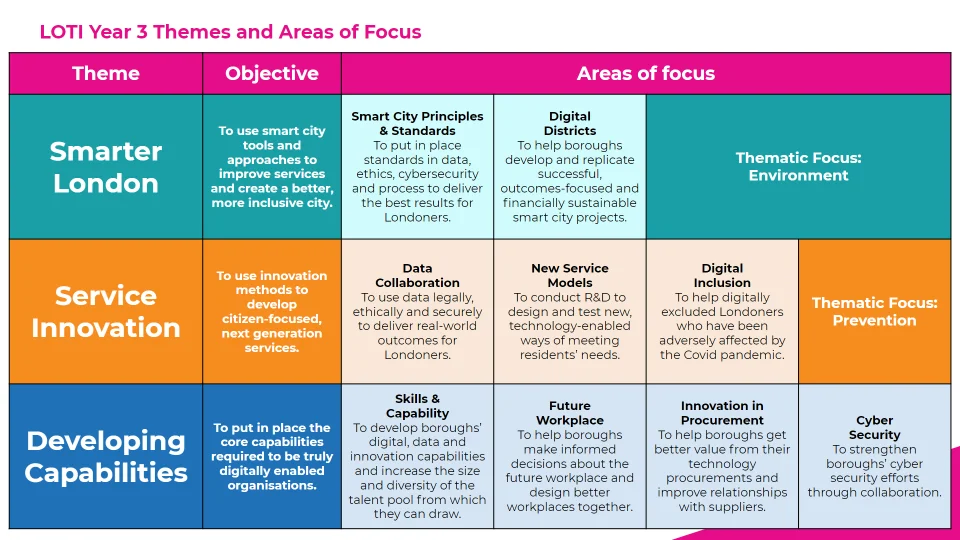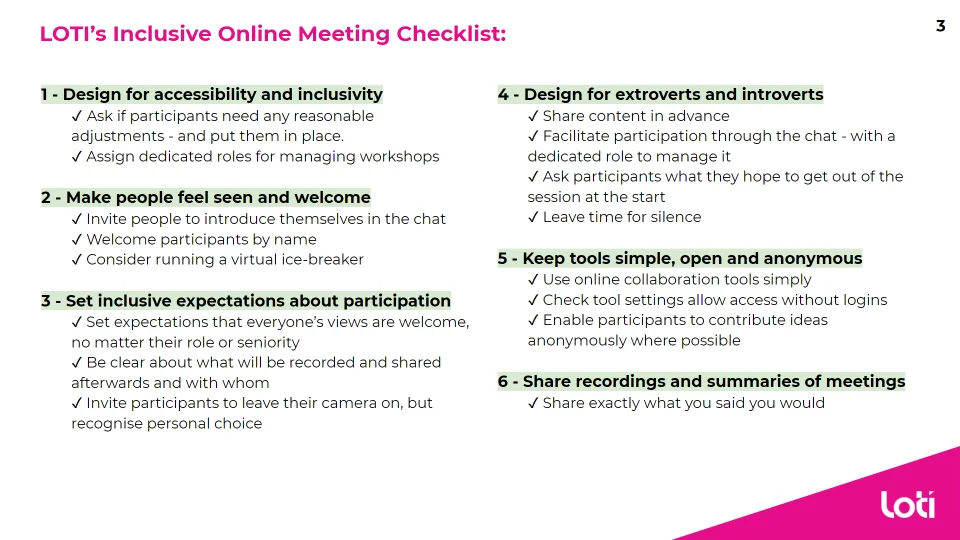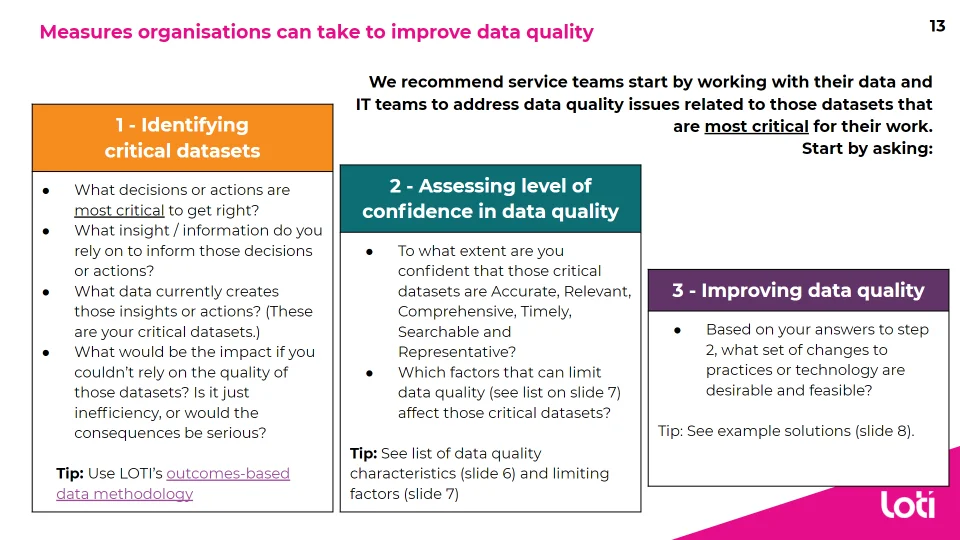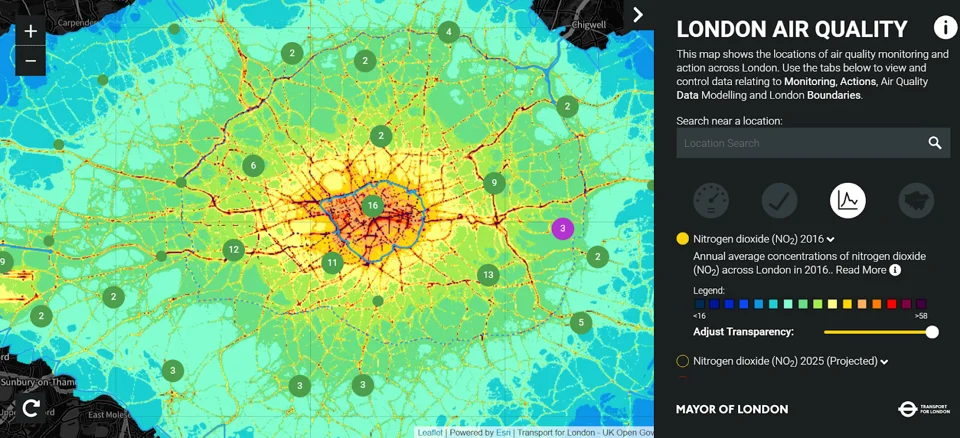25 things LOTI’s been up to since July
Last week marked the end of the first quarter of LOTI’s third year. In this article, I’d like to bring you up to speed on our community’s progress against the Objectives and Key Results (OKRs) we set ourselves for the last three months. Below, you’ll find the list of things we said we’d do outlined according to the three themes and nine areas of focus from our Year 3 Strategy.

As you can see – our members have been busy!
Developing Capabilities
Skills & Capability
1 – Published MVP of the Digital, Data and Innovation Capability Model. We’ve been working with LOTI Fellow, Omid Shiraji, on this project, which aims to help boroughs understand what capabilities and roles they’d ideally have in each of these important areas. We’ve completed gathering all the data that sits behind the model. However, building the MVP has taken longer than expected. We’re currently in discussion with development partners with a view to completing a functioning model during an eight week sprint. In the meantime, you can view a wire-frame demo here.
2 – Completed and published reflections on the LOTI-ONS Data Science Bootcamp. Between July and October 2021, 15 staff from across LOTI boroughs took part in a data science Bootcamp organised by LOTI and the Office for National Statistics. This article summarises the programme and the key insights we and the participants learned from it. In the video below, Anna Trichkine, from the London borough of Hounslow, shares her feedback on the programme. Next, we’ll be evaluating the programme and exploring other training we can provide for our network.
3 – Completed our Data Capacity Discovery. We’ve been working with our community of data professionals to explore the question: “How might we increase boroughs’ access to data talent?” Data skills are vital to local authorities, but many struggle to recruit for those roles, not least because councils can’t compete on salary with the private sector. To complete our discovery, we conducted a survey across LOTI data staff and held an ideation workshop to come up with solutions. We’re now working with recruitment expert Joanne Cumper to develop three ideas. First, establishing a LOTI data academy to improve the knowledge and skills of senior leaders, general council staff and data professionals. Second, establishing a LOTI career’s day and publicity materials to demystify and raise the profile of working in local government data roles. Third, creating a guide to specific steps boroughs can take at each stage of the recruitment process to improve their chances of making a successful hire.
4 – Continued to convene the three LOTI Data Networks. LOTI hosts communities of practice for data professionals at three different levels: Leaders, Managers and Analysts, and Data Scientists. The Data Leaders group meets on a monthly basis to discuss strategic issues and includes representatives from other public sector organisations such as the Metropolitan Police Service. The Data Science group meets monthly and focuses on supporting the LOTI-ONS Data Science Bootcamp. The Managers Group meets quarterly and features a borough case study each time. Anyone wishing to join these groups should contact LOTI’s Jay Saggar.
Future Workplace
5 – Completed interviews for our first report on borough approaches to effective hybrid and remote working. Work on this project had to wait for our recruitment of Sam Nutt as LOTI’s new researcher. Sam joined the team on 20 September and is currently interviewing and surveying all boroughs to understand how they are thinking about the use of technology, office space, staff policies and ways of working following the end of the enforced fully-remote working of the Covid period. Sam will be publishing a series of reports based on that research, which aim not only to address boroughs’ immediate needs and questions, but also seek to provide ideas on how councils can use this opportunity to address long-standing workplace issues.
6 – Published a guide to holding accessible meetings. With so much work now taking place online through video conferences, it’s vital they’re designed to be as accessible and inclusive as possible. We published this guide which talks through 6 areas that can help do just that.

Innovation in Procurement
7 & 8 – Identified business/technology areas and a coalition of boroughs to work on experiments on code sharing and collaborative procurement. LOTI has done a huge amount of work on innovation in procurement alongside Waltham Forest, Hounslow and PUBLIC, including the creation of our Innovation in Procurement Toolkit, publishing of specific guides on Housing Tech Innovation and Best Practice in the UK Public Sector and Housing Tech Supplier Landscape Research. Yet it’s proved extremely challenging to find common procurement areas where boroughs are ready and able to work together. Learning from this, we plan to do deeper dives into specific service areas, such as social care, where we can more easily explore opportunities for collaborative procurement, better engagement with innovative suppliers, and – where needed – development of common tools by local government.
Cyber Security
9 – Completed research phase of a discovery into collaborative cyber security. Working with David Altabev of Urban Frontiers, we’ve been exploring a specific opportunity to improve the way boroughs work together to protect themselves from cyber attacks. That discovery culminated in a detailed report that has been sent to borough CIOs. Conversations are now underway with the National Cyber Security Council and other partners to take the recommendations forward.
Service Innovation
Data Collaboration
10 – Published research on borough approaches to Data Ethics. Data ethics principles are one thing. Embedding them into organisational practice so they’re reliably and consistently used is another. Over the summer, we supported Camden Council to analyse several dozen interviews with residents, conducted as part of the development of their Data Charter. We’ll be working with Camden to share the results of that co-design process soon. We also worked with freelance researcher Catherine Levin to create detailed write-ups of the data ethics governance process being pioneered by the London borough of Brent, the Essex Centre for Data Analytics and TfL. We’ve now published overviews of:
- The Brent Data Ethics Approach – A detailed breakdown of the data ethics approach taken at Brent Council. Including why and how a data ethics board was established and how it operates.
- Data Ethics Process Flow – A generic data ethics process flow based on Brent’s data ethics process.
- Setting up a data ethics process – a checklist – A checklist of steps to take when setting up a data ethics process based on Brent’s approach
- Digital Exclusion Mapping Project – A case study of a multi-organisation project that has been through the Brent data ethics process.
- Essex Centre for Data Analytics (ECDA) – A summary of the data ethics approach taken by ECDA.
- Transport for London (TfL) – A summary of the data ethics approach taken by TfL.
11 – Published LOTI guide to understanding data quality. We created this guide to help Data Teams, IT Teams and Service Staff working in councils have better conversations about data quality, why it matters, and where and how it can be improved.

12 – Launched a discovery into establishing a pan-London Data Ethics process. As part of our commitment to enabling effective data collaboration, we want to figure out what tools, processes and governance structures are needed both in boroughs and at a pan-London level to ensure that data projects are conducted ethically. We’ve outlined our intentions for an eight week discovery in this project brief. We’d love to hear from boroughs and other partners who’d like to support this work.
13 – Scoped out data collaboration project. With all our work on data skills, data capacity and data ethics, we didn’t manage to complete this one. We firmly believe the best way to improve the way boroughs collaborate with data is to find practical projects that do just that. We’ll therefore be focusing on identifying specific project ideas in the next few weeks to conduct during Q2 and Q3. Do you have an idea for a data collaboration project? Jay Saggar would love to hear from you.
New Service Models
14 – Published results of Assistive Technology pilots from Hackney and Greenwich. As part of our work to explore new service models in the field of assistive technology, LOTI funded these two pilots and has now published the write-ups created by the project teams:
- Hackney ‘Connecting People Remotely’ pilot case study: A summary of the main findings from a pilot into the effectiveness of tablet devices, written guidance and 1-2-1 support in reducing social isolation and improving the wellbeing of residents impacted by the Covid pandemic. View the LOTI resource.
- Greenwich’s Amazon Echo Pilot: A summary of findings from a pilot into the effectiveness of voice-activated devices in improving wellbeing and social isolation. View the LOTI resource.
15 – Launched Government Innovators Series. Our original intention was to conduct interviews with interesting innovators from around the world to distil their lessons and practices. We’ll return to that idea, but in the meantime, we’re prioritising working on the LOTI Leadership Series – a collection of short videos and other content aimed at helping council senior officers and elected members better understand digital and data innovation and their role in enabling it.
16 – Commenced Camden VCS data sharing pilot. LOTI supported Camden and Central Bedfordshire councils to secure a second tranche of funding to take forward a project on understanding how data can support and enhance the relationship between Councils and VCS organisations. A pilot will explore how VCS organisations can share data with Camden Council about their activities. Camden Council in turn will share specific information about those at risk of food insecurity. LOTI will no longer be involved in this work, but you can follow the project’s progress via MHCLG’s Local Gov Digital Blog.
Digital Inclusion
The following projects are part of LOTI’s GLA-Funded Digital Inclusion Innovation Programme.
17 – Published final report on key trends and findings from our research into borough digital inclusion initiatives. LOTI crowdsourced >100 case studies of borough and VCS digital inclusion initiatives and then worked with freelancer researcher Will Bibby to dive into the detail and conduct interviews to create a summary report. The final report will be published next week. In the meantime, you can watch Will walk about his key findings and conclusions in the video below.
18 – Completed device upcycling pilots, identified pain points and published a guide on device upcycling. LOTI worked with one of London’s major public sector organisations to experience with them the challenges and pain points of upcycling their retired devices to benefit digitally excluded Londoners. We worked with freelance researcher Ruth Puttick to create this research report into boroughs’ current device retirement practices, and with Will Bibby to produce a searchable list of Upcycling Service Providers, a practical guide on how to upcycle and a process flow map highlighting key actions and pain points.
19 – Launched the Supporting Dementia Care project. People living with dementia were hit particularly hard by the pandemic. Digital exclusion exacerbated their experience. LOTI is now working with the Helix Centre (part of Imperial College London) to co-design and pilot new ways to provide dementia support. We aim to equip community support groups with the right skills and knowledge to provide digitally inclusive services to people affected by dementia and their carers. Hammersmith and Fulham, Westminster, Newham and Ealing are among the first boroughs to sign up to support this work. View the project page.
20 – Launched a discovery into digital exclusion in temporary accommodation (TA). LOTI is conducting an eight-week discovery with FutureGov into the nature of digital exclusion experienced by residents living in London TA hostels. We’ll be producing an insights report with recommendations for practical solutions to be piloted. The Royal Borough of Kensington and Chelsea, Westminster, Camden, Waltham Forest and Hackney have signed up to support this work.View the project page.
21 – Launched Phase 2 of the mapping digital exclusion project. LOTI has extended its work with five boroughs – Barnet, Brent, Kensington and Chelsea, Southwark and Westminster (summarised in this article) – to map digital exclusion in London. To date, the project has created a map of factors contributing to digital exclusion in London, a bank of personas of digitally excluded groups and a toolkit on how to replicate the project approach. The work is continuing with the development of ‘Story Maps’ showing how the data can support interventions for different persona groups.
22 – Published polished versions of the Covid Innovation Fund toolkits. LOTI is now in the final stages of copyediting and designing up toolkits for two projects we funded as part of our work to support Covid recovery. The first toolkit relates to a project developed by Hackney and Newham describing the tools, methods and approaches for setting up a preventative service that supports residents from the first point of contact with the council. The second toolkit is for the Mapping Digital Exclusion project outlined above.
Smarter London
Smart City Principles & Standards
23 – Published LOTI Guide to Designing Smart Cities. We worked with boroughs to produce this guide to help inform the design of borough smart city projects. The guide provides practical advice and explains why smart city projects should:
- Be driven by achieving outcomes that meet the needs of citizens, not the desire to use a specific technology.
- Be conducted openly, transparently and ethically.
- Enable collaboration between different boroughs, systems and service providers.
- Be secure by design.
- Recognise that technology and data alone are rarely the whole solution.
It includes case studies from excellent work being conducted by Westminster, Camden, the South London Partnership and GLA.
24 – Convened LOTI boroughs working on smart cities for idea-sharing sessions. On 29 September, boroughs working on smart city projects got together to discuss opportunities to collaborate. The group identified an opportunity to work on using smart city tools and approaches to improve London’s air quality. Air quality is a classic example of where it would be unhelpful for each borough to have its own siloed approach: Londoners do not want 33 different pollution maps! LOTI is now working up the detail of what this collaboration would entail.

Digital Districts
25 – Designed a sprint event, in collaboration with LEDNet, to bring local government smart city and environment specialists together to focus on net-zero targets. LOTI and the London Environment Directors Network (LEDNet) have planned a series of engagements with the aim of culminating in a design sprint in which borough technology and data teams can work with their environment colleagues to support London’s goals to tackle climate change and other environmental priorities. More details to follow soon.
Thank you!
A huge thank you to all our members and partners who have worked so hard on all the activities outlined above! More details on LOTI’s next wave of activities will be published soon.
In the meantime, follow our latest updates on Twitter.
Eddie Copeland


